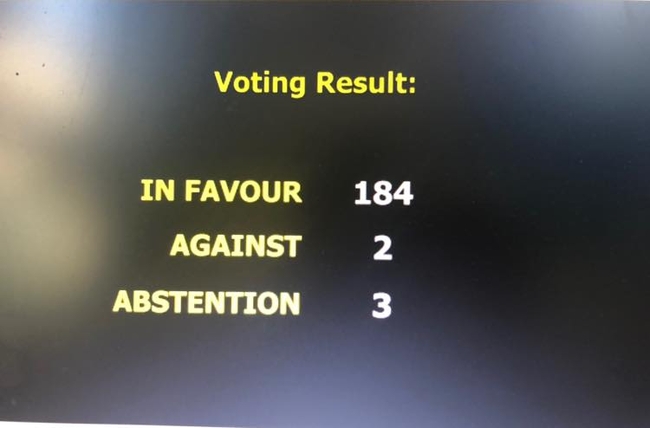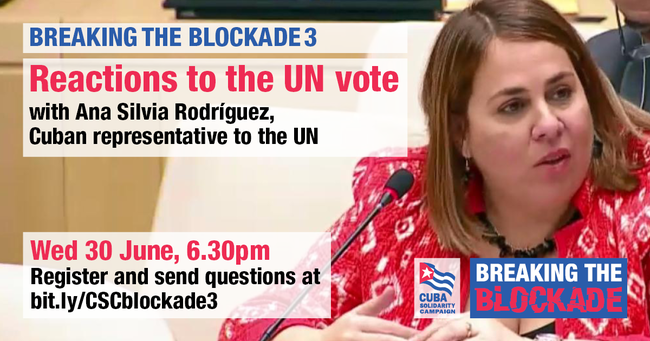US isolated at UN blockade vote: 184 v 2
News from Cuba | Wednesday, 23 June 2021

"Like the virus the blockade suffocates and kills and it must stop.”
Bruno Rodriguez, Cuban Foreign Minister
The United Nations General Assembly (UNGA) has once again overwhelmingly voted in favour of Cuba’s resolution demanding the end of the US blockade. In a strong show of support for the island, 184 countries voted in favour, and only 2 against (US and Israel), while 3 countries abstained (Brazil, Colombia and Ukraine).
This was the 29th vote on the blockade, but the first under the administration of Joe Biden. Although the US president said that he would reverse some of the 240 new sanctions and measures introduced against Cuba by Donald Trump, there has been no change of policy since his election in January 2021.
In an updated report to the United Nations on the impact of US sanctions during April-December 2020 during the COVID-19 pandemic, Cuba said that the intensification of the blockade during this time forced the island “to fight against the most terrible pandemic in decades and against the lengthiest and all-embracing system of coercive measures ever. There is no justification for such gargantuan cruelty.”
The cost of the US blockade against Cuba since its imposition almost six decades ago amounts to over 147.8 billion dollars (or $1.3 trillion if the depreciation of the dollar against the price of gold in the international market is taken into account). Between April and December 2020 alone, it cost the Cuban economy more than $3.5 billion. During this time the US government deliberately blocked a delivery of medical equipment and PPE to help fight COVID-19.
At the United Nations today, counties lined up to speak against the US policy and stand in solidarity with Cuba, repeatedly condemning the escalation of sanctions during the COVID-19 pandemic which had a devastating impact on the country.
“The US uses the blockade as a weapon of war and collective punishment against a people...It is a crime which effects us all as it is a denial of our right to national sovereignty” said the Venezuelan representative.
The Vietnamese representative said that the blockade ran counter to international law, the United Nations charter and was the most unjust and longest blockade inflicted against a country in modern history. “The policy is unjustifiable,” they said.
Speaking on behalf of CARICOM countries, the Haitian representative said that despite the UN voting against the blockade every year, the Cuban people still suffer the impact of the blockade: “CARICOM calls for an immediate and unconditional end to the blockade. We consider the lifting of the embargo to be a prerequisite for any meaningful normalisation of relations between the two countries.”
Despite the blockade Cuba provided medical aid during the blockade, and the Haitian delegate noted the doctors sent to Haiti and thanked Cuba for this “brotherly gesture of solidarity and cooperation.”
China told the meeting that “US bullying will ultimately backfire” and Bolivia described it as “an act of genocide and of economic warfare.”
The South African representative recalled Cuba’s contribution to ending Apartheid in their country and said: “Cuba’s solidarity and internationalism is an inspiration to humanity. Despite the obstacles it faces it shows tremendous resilience. One can only imagine what more this small country could achieve were it able to fulfil its full potential and be allowed to develop.”
“Unjustifiable, illegal and illegitimate at its inception, and six decades later this still holds true. It is an anachronistic policy of confrontation and isolation,” said the representative from St Vincent and the Grenadines. “Following small yet significant progress under Obama – the blockade has been progressively and systematically intensified,” she said.
Many representatives also stressed how the policy hindered Cuba’s ability to realise the UN Sustainable Development Goals.
After more than twenty contributions from regional blocks and countries speaking in support of Cuba, Bruno Rodriguez, Cuban Foreign Minister, addressed the meeting.
“In 2020, Cuba, like the rest of the world, had to face the extraordinary challenges of the Covid-19 pandemic. The United States government used the virus as an ally in its ruthless unconventional war,” he said.
The vast majority of the US people support the lifting of the blockade and their freedom to travel to the island, he said. He described the shortages that Cuba currently faces with people being forced to queue for food, and shop shelves being empty “despite a Herculean effort by the Cuban government”, and lambasted the damage caused by the US measure as a “deliberate aim by the US to punish the Cuban people as a whole. It is a massive, flagrant and systemic denial of the human rights of the Cuban people.”
“It is neither legal nor ethical for a powerful country to subject a small nation, for decades, to incessant economic warfare for the sake of imposing on it an alien political system and a government designed by it,” he said. “Like the virus the blockade suffocates and kills and it must stop.”
The United Nations vote once again shows that the US is isolated in its cruel and vindictive policy towards Cuba. The world has spoken, now it is time for solidarity campaigners to make the US government and Congress listen, and for them to end the blockade and allow the Cuban people access to the medicines and equipment they need to fight the coronavirus pandemic.
Breaking the Blockade – Reactions to the UN vote
Join us live from New York on 30 June to discuss the results of the latest United Nations General Assembly vote with Ana Silvia Rodríguez, Cuba's Deputy Permanent Representative to the UN.
Register today







